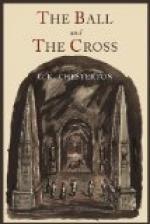Turnbull gave one stamp upon the gravel, then pulled himself together, and resumed: “But why should your infernal head medicine-man lock us up in separate cells while he was turning England into a madhouse? I’m not the Prime Minister; we’re not the House of Lords.”
“He wasn’t afraid of the Prime Minister,” replied Dr. Hutton; “he isn’t afraid of the House of Lords. But——”
“Well?” inquired Turnbull, stamping again.
“He is afraid of you,” said Hutton, simply. “Why, didn’t you know?”
MacIan, who had not spoken yet, made one stride forward and stood with shaking limbs and shining eyes.
“He was afraid!” began Evan, thickly. “You mean to say that we——”
“I mean to say the plain truth now that the danger is over,” said Hutton, calmly; “most certainly you two were the only people he ever was afraid of.” Then he added in a low but not inaudible voice: “Except one—whom he feared worse, and has buried deeper.”
“Come away,” cried MacIan, “this has to be thought about.”
Turnbull followed him in silence as he strode away, but just before he vanished, turned and spoke again to the doctors.
“But what has got hold of people?” he asked, abruptly. “Why should all England have gone dotty on the mere subject of dottiness?”
Dr. Hutton smiled his open smile once more and bowed slightly. “As to that also,” he replied, “I don’t want to make you vain.”
Turnbull swung round without a word, and he and his companion were lost in the lustrous leafage of the garden. They noticed nothing special about the scene, except that the garden seemed more exquisite than ever in the deepening sunset, and that there seemed to be many more people, whether patients or attendants, walking about in it.
From behind the two black-coated doctors as they stood on the lawn another figure somewhat similarly dressed strode hurriedly past them, having also grizzled hair and an open flapping frock-coat. Both his decisive step and dapper black array marked him out as another medical man, or at least a man in authority, and as he passed Turnbull the latter was aroused by a strong impression of having seen the man somewhere before. It was no one that he knew well, yet he was certain that it was someone at whom he had at sometime or other looked steadily. It was neither the face of a friend nor of an enemy; it aroused neither irritation nor tenderness, yet it was a face which had for some reason been of great importance in his life. Turning and returning, and making detours about the garden, he managed to study the man’s face again and again—a moustached, somewhat military face with a monocle, the sort of face that is aristocratic without being distinguished. Turnbull could not remember any particular doctors in his decidedly healthy existence. Was the man a long-lost uncle, or was he only somebody who had sat opposite him regularly




